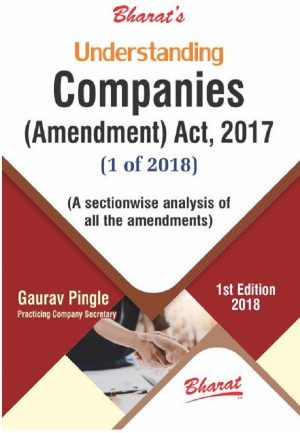The Companies (Amendment) Act, 2017 (‘Amendment Act’) amends 93 sections of the Companies Act, 2013. The amendments in the Amendment Act are broadly aimed at:
(i) Addressing difficulties in implementation owing to stringent compliance requirements,
(ii) Facilitating ease of doing business in order to promote growth with employment,
(iii) Harmonization with Accounting Standards, SEBI, 1992 and the regulations made there under, and RBI Act, 1934 and the regulations made there under,
(iv) Rectifying omissions and inconsistencies in the Act,
(v) Carrying out amendments in provisions relating to qualification and selection of members of NCLT and NCLAT in accordance with Supreme Court directions.
The Amendment Act amends several sections of the Companies Act, 2013 inter alia, including changes in definitions to remove ambiguities, simplifying incorporation process, doing away with Central Government approvals, ease of raising of capital, rationalizing penal provisions related to auditors, reconciling the competing objectives of improving corporate governance and reducing compliance cost.
 The book titled as Understanding Companies (Amendment) Act, 2017 is authored by Gaurav Pingle (Practicing Company Secretary, Pune) is published by Bharat Law House, New Delhi. The book is a systematic and detailed analysis of each provisions of the Amendment Act. The analysis of each section is divided into 5 parts: (i) Extant provisions of Companies Act, 2013 (i.e. before amendment), (ii) Amendment by the Amendment Act, (iii) Analysis of the amendment and its impact on the corporates and practicing professionals on corporate secretarial compliance, (iv) Summary of recommendations made by the Companies Law Committee, (v) Summary of recommendations made by the Standing Committee on Finance. The reader will understand the intentions as well as the impact of the amendment of each section of the Amendment Act.
The book titled as Understanding Companies (Amendment) Act, 2017 is authored by Gaurav Pingle (Practicing Company Secretary, Pune) is published by Bharat Law House, New Delhi. The book is a systematic and detailed analysis of each provisions of the Amendment Act. The analysis of each section is divided into 5 parts: (i) Extant provisions of Companies Act, 2013 (i.e. before amendment), (ii) Amendment by the Amendment Act, (iii) Analysis of the amendment and its impact on the corporates and practicing professionals on corporate secretarial compliance, (iv) Summary of recommendations made by the Companies Law Committee, (v) Summary of recommendations made by the Standing Committee on Finance. The reader will understand the intentions as well as the impact of the amendment of each section of the Amendment Act.
The book also contains a summary in tabular format on the key amendments relating to: (i) Private company, (ii) Public company (listed or unlisted), (iii) Directors & Key Managerial Personnel, (iv) Statutory Auditors, (v) Tribunal, Appellate Tribunal and Special Courts. The provisions of the Amendment Act, has an impact on the working of the Company Secretaries (in employment or practice).
Certain sections of the Companies Act, 2013 have been completely substituted by the Amendment Act which includes (Section 42 – Private Placement of shares, Section 90 – Register of significant beneficial owners in a company, Section 185 – Loans to directors, etc.). For such sections, the author has simplified the substituted sections and provided in the key highlights of the new provision. Wherever required, the author has given the provisions of the Companies Act, 2013 (i.e. provision prior to the amendment).
With an objective to help the readers understand the objectives and intentions of the amendments, the book contains the ‘Statement of Objects and Reasons’ of the Amendment Act. This will help the readers to understand the objectives of the Parliament in introducing 93 amendments to the Companies Act, 2013.
In the Chapter relating to ‘National Company Law Tribunal and Appellate Tribunal’, the author has analyzed the Supreme Court judgments in the matter of Madras Bar Association Vs Union of India (Writ Petition (C) No. 1072 of 2013, dated May 14, 2015) and Union of India Vs R. Gandhi (2010) 100 SCL 142 (SC).
The book also contains the notifications issued by the Ministry of Corporate Affairs notifying each section of the Amendment Act. The introduction of the Amendment Act will trigger an amendment in the Rules or substitution of the existing Rules made under the particular provisions of the Companies Act, 2013. The author has pointed out the relevant provisions of the Amendment Act which will warrant an amendment or substitution of the provisions of the Rules made there under.
In our view, the book will be useful to professionals, such as Company Secretaries, Chartered Accountants, Cost Accountants, Advocates, officials working in law enforcing agencies and students as well.





The Companies (Amendment) Act, 2017 has been approved and passed by the Parliament. The President of India has also given his assent to the Amendment Act (on Jan. 3, 2018).
Now, the Sections of the Amendment will be notified by the Government (2 section were notified on Jan. 26, 2018 and quite a few sections were notified w.e.f. Feb. 9, 2018
Hello Sir,
Has the Act been approved and implemented or still under discussion? If yes, when did it got approve?